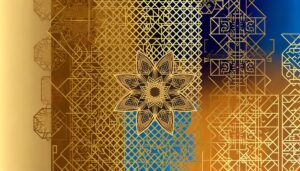Adam Name Meaning in Islam
In Islam, the name 'Adam' symbolizes humanity's divine origin and earthly existence, stemming from the Hebrew word 'adamah,' meaning 'earth' or 'ground.' Adam is regarded as the first human created by Allah and the first prophet. His story includes his creation from clay, receiving divine knowledge, the test in the Garden of Eden, and subsequent expulsion, highlighting themes of fallibility, mercy, and repentance.
Adam's role establishes a spiritual lineage and emphasizes the importance of monotheism and righteous living. This profound legacy continues to shape cultural and ethical practices in the Muslim world.
To learn about these foundational aspects, read on.

Key Takeaways
- The name 'Adam' derives from the Hebrew word 'adamah,' meaning 'earth' or 'ground,' highlighting humanity's connection to the physical world.
- In Islam, Adam is regarded as the first human created by Allah and the first prophet.
- Adam's creation from clay signifies the divine origin and sanctity of human life.
- The story of Adam emphasizes themes of human fallibility, divine mercy, and the importance of repentance.
- Adam's role as the progenitor of humanity establishes a spiritual lineage and unity in Islamic tradition.
Etymology of Adam
The name 'Adam' has its roots in ancient Semitic languages, specifically deriving from the Hebrew word 'adamah,' which means 'earth' or 'ground.' This etymology underscores a profound connection between humanity and the physical world.
The term signifies the foundational belief that humans are intrinsically linked to the earth, reflecting themes of creation and origin. In the context of religious narratives, Adam is often viewed as the archetype of mankind, symbolizing the inception of human existence.
This semantic link to 'earth' emphasizes human beings' reliance on and relationship with their environment. Understanding this etymological background provides a richer appreciation of the name 'Adam' and its significance across various cultural and religious traditions.
Adam in Islamic Scripture
In Islamic scripture, Adam is regarded as the first human being created by Allah and holds a pivotal role as the progenitor of humanity. According to the Quran, Allah fashioned Adam from clay and breathed life into him, bestowing upon him a unique status among creation. Adam was endowed with knowledge and the ability to name all things, a gift that signified his superior intellect.
The narrative of Adam in the Quran includes his placement in the Garden of Eden, his subsequent testing, and eventual expulsion due to disobedience. This story underscores themes of human fallibility, divine mercy, and the importance of repentance. Adam's creation and his experiences set the stage for essential theological teachings within Islam.
Significance in Islamic Tradition
Understanding Adam's significance in Islamic tradition involves recognizing his role as the archetypal human and the first prophet, whose life and actions serve as foundational lessons for Muslim beliefs and practices. Adam's creation from clay and his subsequent endowment with a soul by Allah signify the divine origin and sanctity of human life.
His experience in the Garden of Eden, including the fall from grace and eventual forgiveness, underscores key Islamic themes of human fallibility, repentance, and divine mercy. Moreover, Adam's position as the progenitor of humanity establishes a spiritual lineage that connects all humans, emphasizing unity and equality.
This profound symbolism and the moral narratives associated with Adam underscore his pivotal role in shaping Islamic ethos and values.
Adam as the First Prophet
Adam's role extends beyond being the progenitor of humanity; he is also recognized as Islam's first prophet, entrusted with guiding his descendants towards monotheism and righteous living. According to Islamic tradition, Adam received divine revelations and was taught the names of all things by Allah, symbolizing human knowledge and responsibility.
His prophethood marks the beginning of a covenant between Allah and humankind, emphasizing obedience, worship, and moral conduct. By embodying the principles of faith and communication with the divine, Adam set a precedent for subsequent prophets. His example illustrates the foundational Islamic belief in a direct, unbroken chain of prophetic guidance, ensuring the continuity of divine wisdom and ethical teachings throughout human history.
Legacy in the Muslim World
The legacy of Adam in the Muslim world profoundly influences cultural, spiritual, and ethical dimensions, serving as a cornerstone for Islamic teachings and practices. As the first human and prophet, Adam embodies the intrinsic connection between humanity and divine guidance.
His story is not merely a historical account but a source of moral and theological lessons, emphasizing themes of repentance, divine mercy, and human responsibility. Adam's narrative is interwoven into Islamic rituals, educational curricula, and ethical frameworks, reinforcing the importance of obedience to God and the pursuit of knowledge.
His example continues to inspire Muslims to pursue for righteousness, reflecting on the foundational principles of human existence and their relationship with the Creator.
Conclusion
The name Adam holds profound significance in Islam, symbolizing the inception of human life and the prophetic tradition. Islamic scriptures and traditions portray Adam not only as the first human but also as the first prophet, imparting divine wisdom to his descendants. Adam is believed to have first received the divine revelation in the Garden of Eden, where he and his wife, Hawwa (Eve), were created and placed by Allah. The meaning of Eden in Islam represents a sacred and heavenly abode where Adam and Hawwa lived before being sent down to Earth. The story of Adam and the Garden of Eden holds deep spiritual significance in Islam, teaching lessons of obedience, temptation, and the consequences of disobedience.
How does the legacy of Adam continue to influence contemporary Muslim identity and spirituality? By examining Adam's role, one gains deeper insight into the foundational beliefs and values that shape the Muslim world.






